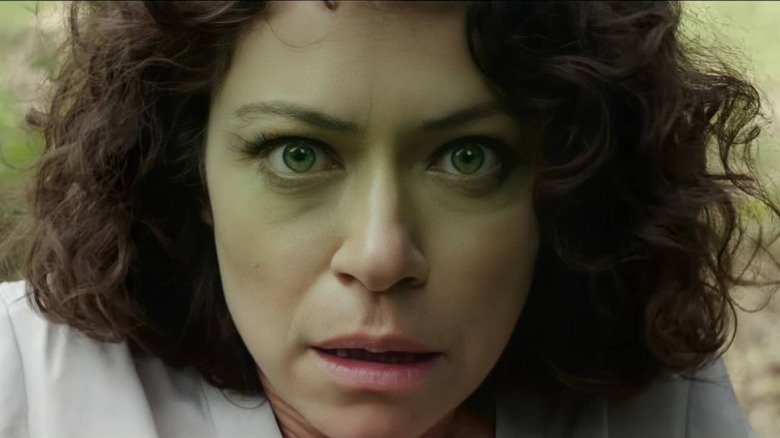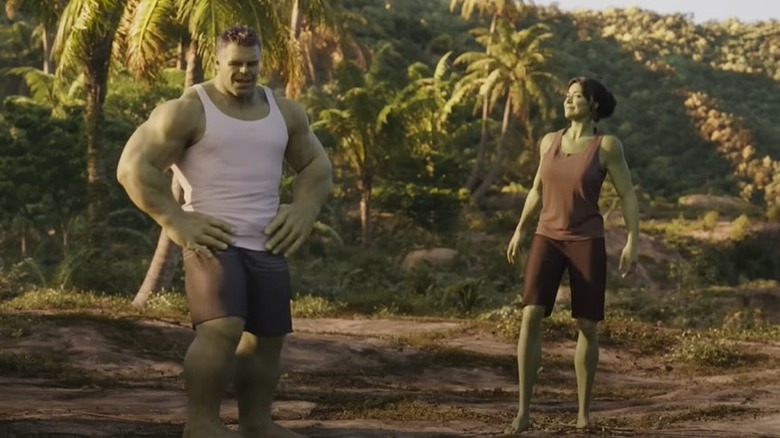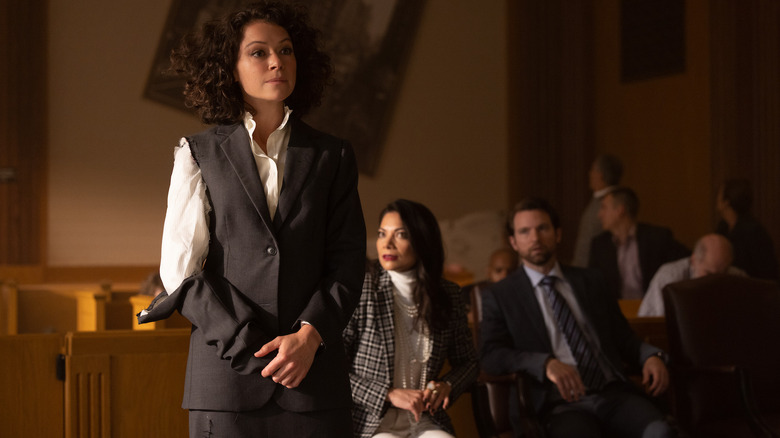She-Hulk Takes A Major Swing With The Marvel Formula, But Does It Pay Off?
Spoilers for the first episode of "She-Hulk" follow!
"She-Hulk: Attorney At Law" marks something of a turning point for the Marvel Cinematic Universe — potentially, at least. Where so many prior Disney+ shows have taken similar paths to telling their respective stories, operating roughly within the same genre and never really diverging from the Marvel formula ("WandaVision" remains one of the only notable exceptions to this rule, although even then it regressed into conventional superhero antics), the story of Jennifer Walters (Tatiana Maslany) navigating her legal career while dealing with her own Hulk-sized problems lends itself to a much different approach.
With early buzz largely in the show's favor and Maslany's talent well-known to those who witnessed her incredible range in dozens of roles in the clone-heavy "Orphan Black" alone, last night's premiere of "She-Hulk" arrived with quite a bit of fanfare and high expectations. And in the opening moments, it certainly seems as if Marvel's newest series will boldly chart its own path — specifically, by doing away with the urge to depict another standard superhero origin story. Unfortunately, "She-Hulk" immediately backtracks on that in profoundly disappointing fashion.
Only moments after establishing that our very human-looking hero had already undergone her transformation into She-Hulk as a close confidante casually jokes about her unusual circumstances, Jennifer turns to the camera (as she's wont to do) and, shockingly, all but admits to viewers that the writers believe most fans don't have the attention span to watch a legal comedy without all the smashy superheroics spoon-fed to them beforehand. Just when things were getting interesting, we're suddenly back in familiar MCU territory: Mark Ruffalo's Bruce Banner riding shotgun to Jennifer when a (bizarrely unexplained) spaceship forces them off the road and kicks off her origin story.
Did it have to be this way?
That pesky origin story
While the training sequences between Bruce and Jennifer aren't an issue in and of themselves — in a vacuum, they're some of the most entertaining moments in the entire episode — the premiere nonetheless hamstrings itself by insisting on playing it safe. Rather than trusting audiences enough to gradually become invested in the main character, by virtue of her strong personality and unique journey in balancing these two halves of her life, the choices made in the premiere instead make a far more uncomfortable suggestion: that viewers care more about superpowers (and, even worse, the explanation behind those superpowers) than the actual heroes themselves.
Tellingly enough, this wasn't how "She-Hulk" was originally meant to kick things off.
Creator and writer Jessica Gao ("Rick and Morty) has been making the press rounds ahead of the premiere of her new series and teasing what to expect from a show with, at the very least, aspirations of setting itself apart from the rest of the MCU. As any creative trying to succeed in this IP-or-bust landscape can tell you, however, studios can be incredibly reticent to divert too much from expectations. Gao and the rest of the writer's room may have discovered this the hard way, as evidenced in a recent interview with Variety. When asked about changes made in post-production, Gao's answer proved to be extremely revealing:
"The episode order was slightly different — we changed things up a little bit in post. Most of the pilot that you see was actually Episode 8. We [originally] waited until the very end of the season to really reveal her origin story."
"...we just realized people really wanted to know that information sooner. It was hard for them to not know the origin story and then get to know this character."
A bad omen?
At the end of the day, is this really a big deal? Does one somewhat shaky premiere with a painfully rote origin tale, altered in post seemingly with Marvel's reliance on test audiences in mind, mean the rest of the series is doomed to fail? Obviously not ... but it's not exactly a show of confidence in the concept of "She-Hulk" and the charisma of Tatiana Maslany to win viewers over, either. After all, if any series called for taking a break from the franchise's usual playbook, wouldn't it have been this one?
Much has been written about how Marvel typically handles origin stories (although there have been exceptions), laying the blame at the temptation to stick to formula rather than test the limits of what these characters are truly capable of. Allowing viewers to experience such life-changing events alongside the hero at the beginning of a new series isn't inherently flawed, of course, but how meaningful can that actually be when the show hardly gives viewers a chance to get to know our protagonist – not just her passion for her career or her reluctance to be a superhero, but what really makes her tick — in the first place?
Ending the premiere episode on the rousing note of her first public transformation into She-Hulk should feel momentous and character-defining, but instead falls flat when there was so little build-up and when we have so little of her normal life to compare it to. Despite the well-intentioned idea of treating fictional women no differently than Marvel's many three-dimensional male heroes, Jennifer Walters remains a complete cipher whose defining characteristic seems to be that she ... loves her job?
Perhaps future episodes of "She-Hulk" can make up for this slow start, streaming on Disney+ every Thursday.


